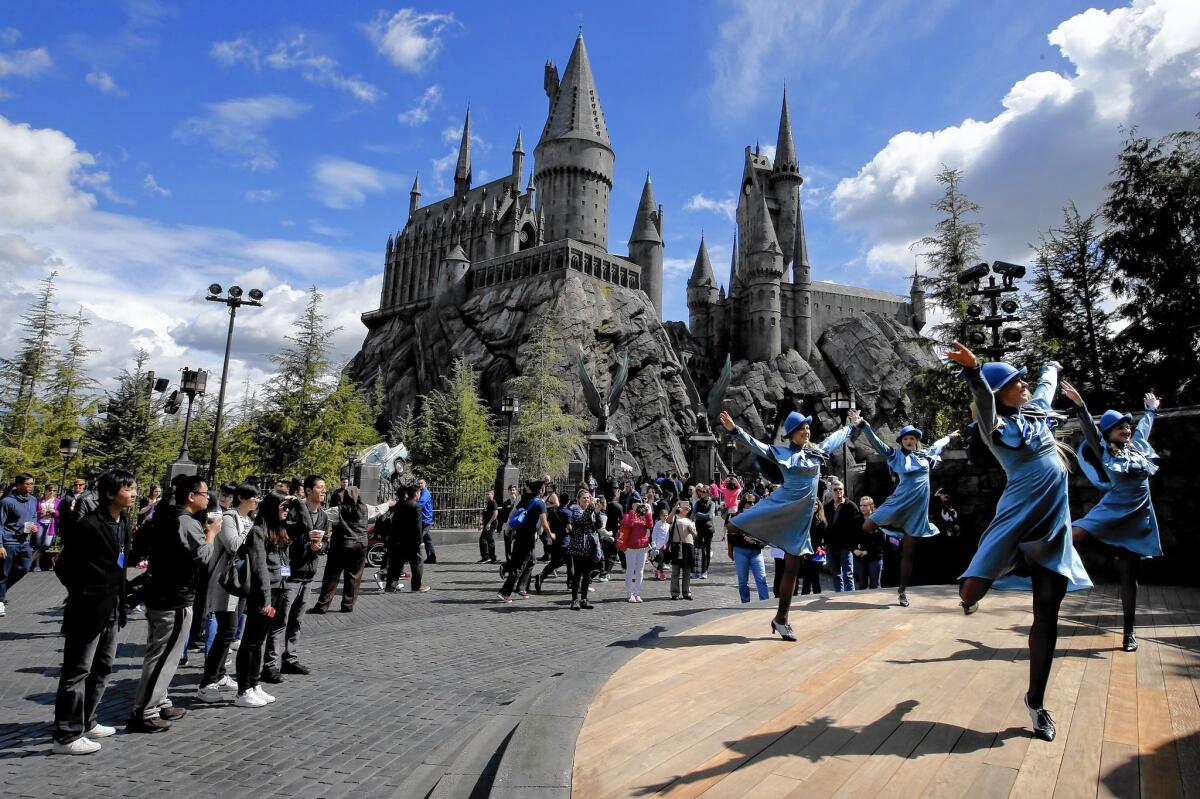Here’s the biggest challenge facing Universal Studios when Harry Potter land opens

The Wizarding World of Harry Potter at Universal Studios Hollywood is set to open April 7.
- Share via
It doesn’t matter that Adrienne Aipia has already visited Harry Potter attractions in London (once) and Orlando, Fla., (twice).
When the latest version opens April 7 at Universal Studios Hollywood, the marketing manager from Los Angeles plans to squeeze into the replica of Hogwarts Castle with the rest of the expected throng.
“I’m looking forward to seeing the faces and feeling the energy on opening day,” Aipia said.
The Wizarding World of Harry Potter is likely to be the most popular attraction to ever open at the Southern California park, if the multitudes at similar Harry Potter hangouts at Universal Studios in Orlando and Japan are any indication.
And it doesn’t take a wizard to divine that the biggest challenge for Universal Studios executives will be managing the congestion when fans storm the six-acre simulacrum to buy wands and robes and queue up for a high-tech flying ride.
“At the end of the day, this Harry Potter phenomenon is so large and so big that we don’t know how many guests will show up,” said Mike Bogosian, a crowd management expert and president of Crowd Management Consultants of Maine.
The amusement park industry pioneered the art of crowd management, with wrap-around configurations obscuring line length and entertainment to kill time. Technology allows for wait estimates and come-back-later options.
Universal Studios has already adopted several crowd-easing strategies, including the installation of a virtual queuing system at the entrance of the Harry Potter land, enabling guests who show up during congested periods to make an appointment to return when crowds are lighter.
To encourage parkgoers to visit during off-peak days, the park has instituted a new pricing strategy that offers discounts of up to $20 on daily tickets to guests who visit on low-demand days, such as Tuesdays and Wednesdays in the fall. The new system lets the park manage the number of tickets sold on any specific day.
Visitors who buy daily tickets from the park’s website also get to enter the Harry Potter attraction an hour before it opens to the general public.
“The goal is not to have the whole crowd arrive at the Harry Potter attraction at the same time,” Bogosian said.
Universal Studios representatives are loath to acknowledge potential crowding let alone how the park would mitigate it. But they noted heavy investments on infrastructure upgrades, including two new parking structures, a widening project for the street that enters the park and a pedestrian bridge from the Metro Red Line station to the park entrance.
At least one new attraction has built-in crowd management strategies.
Harry Potter and the Forbidden Journey, the featured attraction, is a motion-based ride that uses 3-D technology and moving ride vehicles to make riders feel as if they are flying along with Harry Potter, dodging dragons and the dark lord Voldemort. The ride’s line snakes through Hogwarts Castle so that visitors are entertained during the wait by authentic movie props, 3-D videos and paintings that come to life.
The most advanced crowd management techniques are often invented by theme parks and replicated later for use at sporting events, museums and music concerts, according to industry experts.
Theme parks spend heavily to ease crowding because long queues and gridlock are among the top visitor complaints. The challenge for park managers is to attract big crowds but keep foot traffic moving to avoid angering parkgoers and discouraging them from returning, according to crowd management experts.
“First and foremost, you have to think about customer satisfaction, which means they must want to return to the park and increase profits,” said Paul Wertheimer, principal at Crowd Management Strategies of Los Angeles.
If lines get long and frustration boils over during the upcoming hot summer months, Adam Leggat, a crowd control expert with Texas-based Densus Group, said it will be important for the theme park to deploy staff to tell visitors how long they may be waiting and to offer them alternative attractions to visit until the crowds at the Harry Potter land decrease.
“The more information you can give people in a busy area, the more likely they are to cooperate with what you are trying to achieve,” Leggat said.
Another reason to keep lines moving: the less time people spend in queues, the more time they have to buy food, drinks and souvenirs, Bogosian said.
“If I have to wait 10 or 15 minutes in line for a ride, I may eat more than once,” he said. “They are not making money off of the ride, they are making money off of the food and beer.”
For its 60th anniversary celebration last year, Disneyland adopted several crowd-reducing tactics, including opening “bypasses” — little-used routes behind and parallel to Disneyland’s Main Street to help move people in and out of the park.
When the Harry Potter attraction launched in 2010 at Universal’s Islands of Adventure in Orlando, some opening-day visitors waited as long as five hours just to enter the new land. Others stood in line for 75 minutes to cross the wand shop’s threshold. It took two hours to get on the Harry Potter and the Forbidden Journey ride, exacerbated by a few breakdowns.
Attendance at Islands of Adventure shot up 20% and revenue jumped 41% compared with the previous year.
The Los Angeles version will be less than a third the size of Orlando’s attraction. Still, fans say they won’t stay away from the park to avoid the crowds.
“Everyone will be walking around with their wands,” said Laura Davis, a Potter devotee and executive assistant from Sherman Oaks. “It will turn into a huge Harry Potter party.”
The Southern California park already has been reporting rising attendance, thanks to the addition of several attractions in the last few years, including the Despicable Me Minion Mayhem ride in 2014 and Fast and Furious: Supercharged in 2015.
Attendance at Universal Studios Hollywood rose 11% in 2014, surpassing the average attendance growth of 2.2% for North America’s top 20 theme parks, according to an estimate by the Los Angeles engineering firm Aecom.
And the park continues to grow, with plans this summer to open a haunted maze attraction based on the AMC television series “Walking Dead.”
Twitter: @hugomartin
ALSO
Nestlé water source draws U.S. review
Starwood Hotels jumps at Anbang’s sweetened bid; Marriott could counteroffer
Judge grants restraining order blocking Tribune’s purchase of the O.C. Register
More to Read
Inside the business of entertainment
The Wide Shot brings you news, analysis and insights on everything from streaming wars to production — and what it all means for the future.
You may occasionally receive promotional content from the Los Angeles Times.











